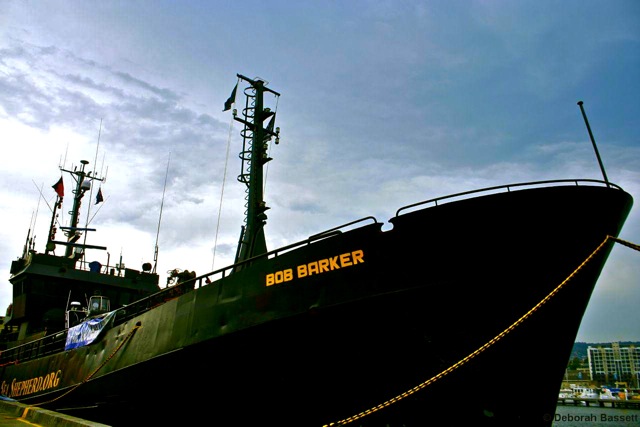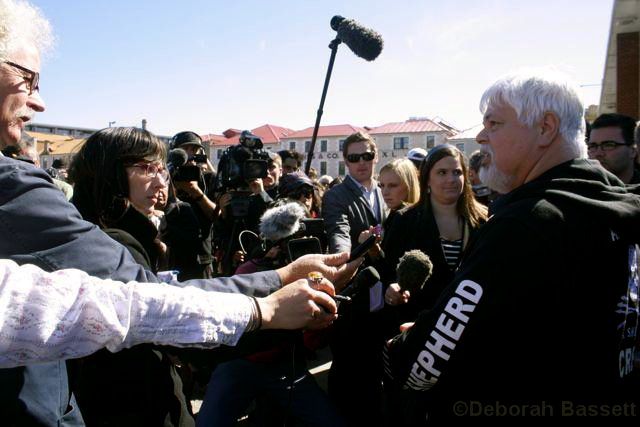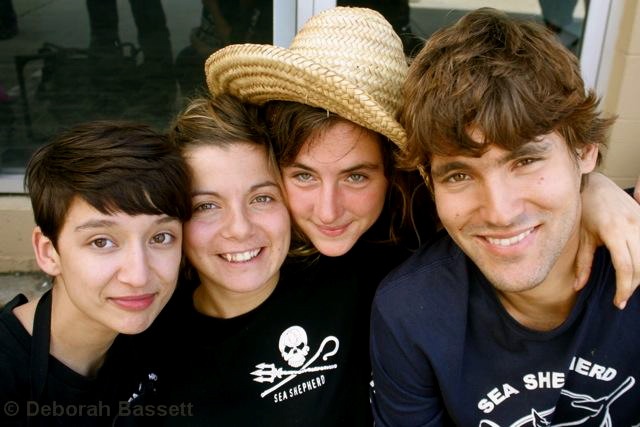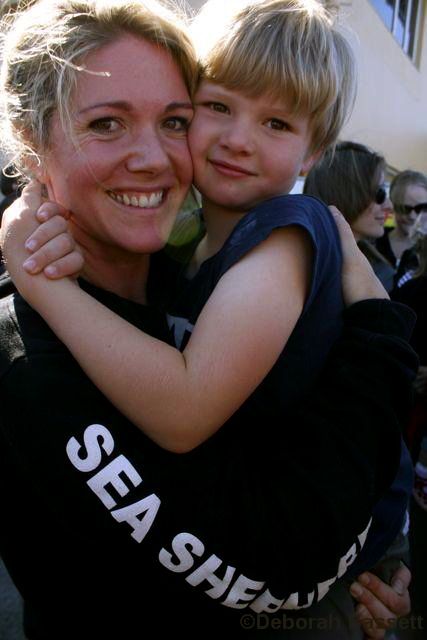

Last week I had the opportunity to spend a week aboard The Sea Shepherd Conservation Society's vessels, The Steve Irwin and The Bob Barker upon their return to port in Hobart, Tasmania after successfully shutting down Japanese whaling operations in the southern ocean whale sanctuary--a victory that has been 7 years in the making.
Media and film crews were on hand to welcome home the captains and crew along with family, friends and supporters who showed up with fresh fruit and produce as gestures of gratitude for the ocean defenders, some who spent 94 days at sea without fresh provisions. Australian Green party member and long time Sea Shepherd advocate, Bob Brown held a press conference with Captain Paul Watson to express his support and appreciation for this year's monumental victory for the whales.

In June 2010, a compromise deal proposed by the International Whaling Commission (IWC) would have allowed for the exchange of legalized whaling in return for bringing the hunt under IWC control. While conservationists were somewhat relieved when the deal was ultimately forfeited, the concept of compromise simply does not exist on Watson's radar who has no qualms in admitting that first and foremost he represents the interests of his clients--the whales. During this year's 7th Antarctica campaign, appropriately dubbed Operation No Compromise, Watson and his crew once again returned to the 'battleground' stronger, faster and more prepared than ever to put a cease to the bloodbath where the Japanese continued to target endangered and protected whales inside the boundaries of the Southern Ocean Whale Sanctuary in violation of a global moratorium on commercial whaling and the Antarctic Treaty that prohibits commercial activity south of sixty degrees.
The Shepherds perserverence and determination paid off as they relentlessly chased the whaling fleet for thousands of miles east to the border of Chile's Exclusive Economic Zone (EEZ) and eventually escorted the defeated Japanese fleet out of the sanctuary, sending them limping back to Tokyo over 800 whales short of their annual quota. The Japanese government specifically cited Sea Shepherd's intervention as the primary reason for throwing in the towel early this year. Last year Japan issued a warrant for Watson to Interpol which classified him as "wanted under the blue list." Yet, once again Watson proved that direct action, when legally and safely orchestrated, can be the most effective strategy in shutting down such illegal operations and crimes against nature. According to Watson:
"Despite the propaganda from Japan, Sea Shepherd is not doing anything illegal. None of our ships have been charged or detained, we have not been reprimanded, and we have not been charged with a crime, not even by Japan. Sea Shepherd ships have access to Australian and New Zealand ports, Japanese whaling ships do not. The Japanese whalers are also officially in contempt of an Australian Federal Court order prohibiting the killing of whales in Australian territorial waters."
While the Japanese continued to kill whales in the Australian Antarctic Economic Exclusion Zone, year after year the Australian government has turned a blind eye to the illegal activities leaving Watson and his courageous crew with the daunting task of defending international maritime law and treaties-- with no back up- in some of the toughest and most dangerous seas and weather conditions in the world. According to Sea Shepherd Australian Director, Jeff Hansen:
"Sea Shepherd is defending Australian territory and doing what the Australian people want to be done but the government doesn't have the guts to do. Australia has gone from a nation that used to hunt whales just over 30 years ago to one of the most passionate defenders of whales in the world."
During my time on board I had the chance to get to know several of the 88 crew members, whose citizenships span over 23 nations including Japan and Australia, resembling more of a delegation of The United Nations than a group of dangerous "eco-terrorists," as they are often depicted in the Japanese press. From marine biologists and Phd candidates to US veterans and skilled tradesman, I was highly impressed by the wide array of diverse cultural background and areas of professional expertise of "Neptune's Navy" and inspired by the deep sense of camaraderie between crew mates.
Soft spoken and humble 21 year old Alexandra Schmuck of Germany explained to me that this was her first campaign working in the engine room of The Steve Irwin and that she felt fortunate to be part of such a momentous and important campaign and proud of the job that she and her crew mates had accomplished. The underlying desire to be a part of a movement to save the lives of innocent and threatened species on the planet from the hands of corporate profit and greed seemed to be the common denominator between all crew mates who were well aware of the potential consequences of braving the harsh and unforgiving conditions the Southern Ocean. In fact the crew of the Steve Irwin faced one of the worst storms in over 30 years in Antarctica that claimed the lives of 3 Norweigan sailors and sent the Shepherds into a full search and rescue mission for the lost vessel that sadly would never be recovered.
 Sea Shepherd Crew--"eco-terrorists"?
Sea Shepherd Crew--"eco-terrorists"?
"It is well overdue that the whale murder in the Sanctuary is over, once and for all and that true respect and freedom for the Cetaceans and other marine mammals becomes manifest throughout the world's oceans," added Quartermaster of The Steve Irwin and Co-founder of the marine conservation organization, Surfers For Cetaceans, Howie Cooke. When not aboard the Steve Irwin, the lifelong Ocean activist and Byron Bay resident, can be found armed with a paintbrush, creating epic life size whale murals and educating school children around the world on the importance of maintaining healthy and living oceans--wow, the FBI better keep their eye on this whale-loving artist!

Hobart native, Megan Jolley (left), 34, was greeted by her son Harrison upon the ship's return to port after over a month at sea. "It was of course tough as a parent to leave my child, but it's something I felt compelled to do for him and the future generations. I want him to know when he is older that I didn't just sit by and do nothing. Of course, I couldn't have done it without the massive support of my family," stated the Cardiology Specialist and Fitness Instructor.
International headlines were made during last year's campaign when the futuristic vessel, The Ady Gil, was split in half by a collision with a Japanese whaling vessel as featured on Animal Planet's Whale Wars. However, Watson's ability to turn mishaps into positive outcomes is just one of the many traits that make him a master strategist and overall legend in the direct action environmental movement. Watson replaced the interceptor vessel with the latest addition to the fleet, The Gorjira, which not only stepped up the game but perhaps made the critical difference in this year's success.
According to Gojira Captain Locky Maclean, "The Gojira proved an effective campaigning ship, as she could outrun the harpoon vessels and run without being tailed. Gojira located the refuelling vessel, Sun Laurel, and engaged the harpoon ship Yushin Maru 3 which enabled the Bob Barker to get away and she used her stealth and speed to locate the Nishin Maru factory vessel." Added Watson:
"This is the strongest the Sea Shepherd fleet has ever been. We have three vessels, a new longer-range helicopter, new equipment, and three incredibly dedicated volunteer crews. Sea Shepherd's objective has long been to sink the Japanese whaling fleet economically - to bankrupt them, and it is a strategy that appears to be working."
Watson has made it clear that if the Japanese intend to return to the sanctuary next year with Navy vessels as they have implied in recent press, then he and his fearless crew will once again be there to greet them. In a commentary dated March 5th, he wrote:
There is a very real possibility that Japan may not send a whaling fleet to the Southern Ocean at the end of this year, and if they do, we will be prepared to oppose them once again. But we would rather not. We would rather that the whales of the Southern Ocean Whale Sanctuary be left in peace. We have spent seven seasons intervening against these whale poachers. Each season gives us more support than the year before, and each season increases our resources, strengthens our supply lines, and increases our effectiveness.
The following video offers a recap of some of the highlights from this year's campaign.
Operation No Compromise: A Campaign in Review - Sea Shepherd Conservation Society from Cam Currie on Vimeo.
For More Information: www.seashepherd.org